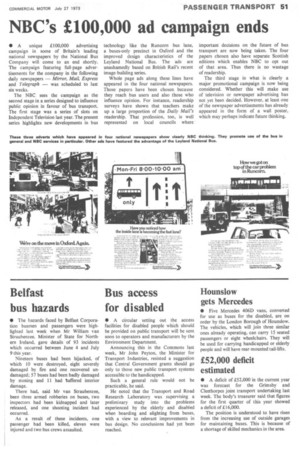NBC's £100,000 ad campaign ends
Page 53

If you've noticed an error in this article please click here to report it so we can fix it.
• A unique £100,000 advertising campaign in some of Britain's leading national newspapers by the National Bus Company will come to an end shortly. The campaign featuring full-page advertisements for the company in the following daily newspapers — Mirror, Mail, Express and Telegraph — was scheduled to last six weeks.
The NBC sees the campaign as the second stage in a series designed to influence public opinion in favour of bus transport. The first stage was a series of slots on Independent Television last year. The present series highlights new developments in bus technology like the Runcorn bus lane, a buses-only precinct in Oxford and the improved design characteristics of the Leyland National Bus. The ads are unashamedly based on British Rail's recent image-building series.
Whole page ads along these lines have appeared in the four national newspapers. Those papers have been chosen because they reach bus users and also those who influence opinion. For instance, readership surveys have shown that teachers make up a large proportion of the Daily Mail's readership. That profession, too, is well represented on local councils where important decisions on the future of bus transport are now being taken. The four papers chosen also have separate Scottish editions which enables NBC to opt out of that area. Thus there is no wastage of readership.
The third stage in what is clearly a major promotional campaign is now being considered. Whether this will make use of television or newspaper advertising has not yet been decided. However, at least one of the newspaper advertisements has already appeared in the form of a wall poster, which may perhaps indicate future thinking.
























































































































































